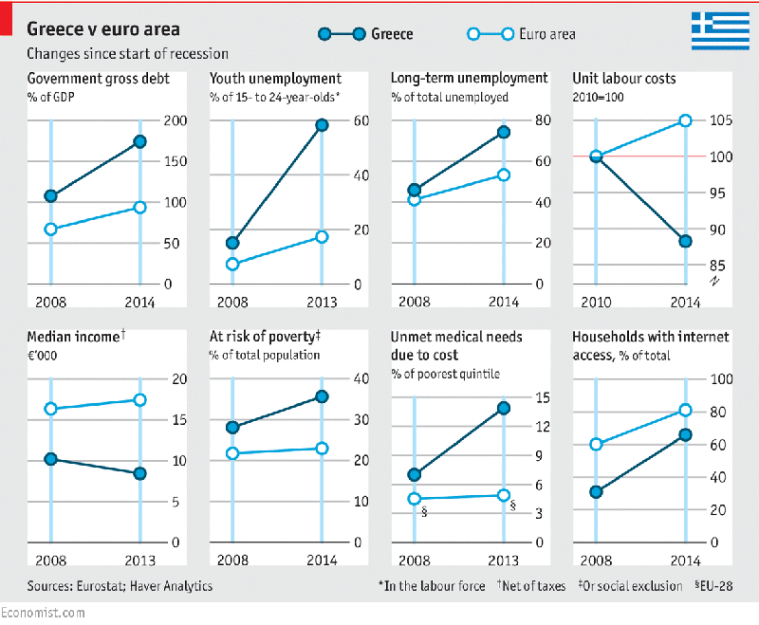The EU Mixing True and Fiction in Dealing With Greece
February 12, 2015 Leave a comment
The European Union authorities and the media are constantly talking about reduction of Greece’s debt whereas it is about the turnaround of the Germany’s insisted austerity policies that have wracked the EU ever since the 2007-9 Recession. An approach of ‘bagger your neighbor’ by keep cutting social services, education, medical, and any governmental expenses – the theory goes: ‘when a market gets indebted by cutting expenses and regulations such market becomes attractive to foreign direct investment with its low salaries, desperate work force under high unemployment, low social expenses, cheep prices privatized assets, etc idyllic conditions for the large investors and transnational corporations to move in raise productivity and get such market becoming competitive and sound’; however, that was suppose to happen, instead – the unemployment reached heights unknown, the consumption plummeted without attracting major investment or rising productivity – in reality, the whole theory that is founded by neo-liberalism collapsed prolonging slow if no growth in-and-out of recession business environment followed by rising National Dept as a percentage of an ever declining GDP – it has become a ‘catch 22’.
The Brussels bureaucrats and the Berlin masters instead of sitting down in comprehensive evaluation of these realities has continued to call their mantras until Greece elected a totally different and not controlled by them government who called for change.
Seemingly, the Greece’s insufficiencies in administration and business environment did – in the past – cause substantial debt, the EU actions targeted reducing the existing administration and improving business to overcome these insufficiencies; in practice, nothing good came out of the austerity measures but misery, unemployment, lack of development, so obviously the reasons for these insufficiencies were not the one evaluated by the ideologically inclined Brussels and Berlin, or at least the actions requested were not the right one to change the existing pattern, you should recognize them by the results: higher unemployment, increasing Debt to GDP ratio, and total economic collapse of the Greek market equilibrium and development.
What went wrong and why the liberalism did not perform? One sentence: – the exogenous pressure were not accounted for and taken in consideration – the Globalization and rising Productivity have brought pressures in manufacturing, employment, technologies changing the pro-supply market growth of the Capitalism that could have been positively affected by the Austerity into a pro-demand (pro-market equilibrium) market development of the 21st Century in which inflationary forces change with deflationary, exogenous factors take larger percentage from economies/markets, and the Economics must change to accommodate these changes in order to perform, the Liberalism has not done it and therefore the results are negative. Greece is a best example of these new developments: the high debt and unemployment, and lack of growth will persist unless new approaches are used to take the Greek as well entire EU.  Joshua Konov, 2015
Joshua Konov, 2015
Recent Comments